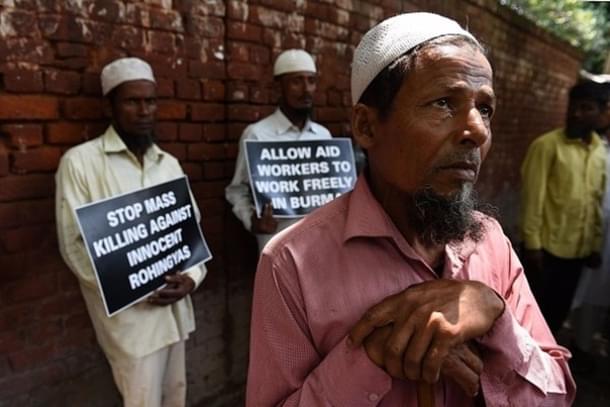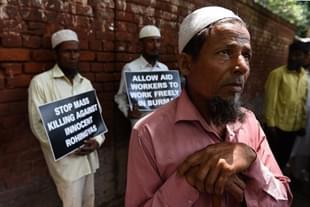Ideas
PM Modi Flags Rohingya Problem In Jharkhand: Why Both Government And Society Need To Be Extra Vigilant
Aravindan Neelakandan
Sep 17, 2024, 07:16 PM | Updated Oct 03, 2024, 11:14 PM IST
Save & read from anywhere!
Bookmark stories for easy access on any device or the Swarajya app.


On 15 September, 2024, talking at an election rally, Prime Minister Narendra Modi pointed out that infiltration of Rohingya Muslims and Bangladeshis in Santhal Pargana and Kolhan of Jharkhand were emerging as a threat of serious concern for the tribal population there. He also pointed to the Rohingya take-over of the local bodies of governance like Panchayats.
Beyond being a campaign issue, the Rohingya problem is a broader, pan-Indian challenge that is quietly spreading across regions, including the south.
The current cycle of violence between the Myanmar army and Rohingyas began in 2017-18. While reports of Myanmar army attacks on Rohingyas and the resulting exodus are well known, along with widespread condemnation of military actions, what has been underreported in the media's narrative is the elimination of Hindu communities in Myanmar by the Rohingya.
On 25 and 26 of August 2017, Rohingya terrorist group, the Arakan Rohingya Salvation Army (ARSA), attacked a Hindu community in northern Rakhine region of Myanmar.
One should note here that the conflict in that country is between the Rohingyas and the army of the Buddhist State. Why then should the Hindus be targeted?
The answer is in what they actually did to the Hindus.
An Amnesty International Report of May 2018 has the following paragraph.
There are other gory details which have not been presented here:
After binding, robbing, and blindfolding the Hindu villagers, ARSA fighters marched them to a creek area on the outskirts of the village. There, the fighters sat the villagers down and burned their ID cards, which they had confiscated earlier. They then divided the men from the women and children, and brought the women into the forest. The fighters killed, execution-style, 53 of the Hindus from Ah Nauk Kha Maung Seik, according to a list of the dead seen by Amnesty International that is consistent with testimony from survivors, other Kha Maung Seik residents, and Hindu community leaders. The victims include 20 men, 10 women, and 23 children, 14 of who were under the age of 8.16 Only 16 people – eight women and eight of their children – survived, their lives spared on the condition that the women agreed to “convert” from Hinduism to Islam and then marry people selected by ARSA fighters.
This was nothing short of what ISIS did to the Yazidis. The methodology is the same because the theology is the same and the political objective is the same.
The attackers then moved into Bangladesh along with those captured and posed as refugees. (The report can be downloaded here).
There was not even a single demonstration in India against such a massacre of the minority Hindu population of Myanmar. Reports do exist, but when it comes to Hindus, their massacre is reduced to mere numbers.
No one speaks up for their basic human rights. Both Hindus and Muslims are minorities in Myanmar, yet those who express outrage for Rohingyas rarely show concern for the Hindus.
And then the Rohingyas moved into India.
In India, they have well networked organisational support. A narrative in their favour is also ready. These narratives are prepared professionally and disseminated at various levels. This in turn blinds the unsuspecting Hindu civil society to see them as refugees. The same political party–NGO cabal that organises virulent opposition to CAA, also welcomes the Rohingyas.
Here is an instance from Tamil Nadu.
‘Freedom and Refugees’ (FAR) is a newsletter run by Jesuit institutions. It is a joint venture of ‘Jesuit Refugee Service’ (JRS) and ‘Loyola Institute of Social Science Training and Research’ (LISSTAR), Chennai.
The former is an international body that works with refugees worldwide. Though they do not overtly display any evangelical agenda, the evangelical intentions become clear whenever the situation arises.
In FAR newsletter of July 2024 (Vol.7 No.7), there is writeup on Rohingyas in southern India, by a student doing her post-graduation in International Relations at Loyola College (Autonomous) Chennai. In this we read the following:
Aisha, an 8th grade student from a Rohingyas family is a bright and ambitious young girl. Her love for the Tamil language, which she learned from her friends, has made her the family’s translator in Chennai where the common language is Tamil…. She likes celebrating Diwali and Bakrid with her family, cherishing the joy and love that these festivals bring. Aisha’s mother Yasmin travelled from a small yet vibrant neighbourhood in Myanmar with her two neighbours, Jamila and Ibrahim to rebuild their lives in Chennai, India.
The names have been changed in the story to protect the identity of the persons. The family of the girl had come to Chennai as early as 2012 the essay says. But notice the all positive imagery, ‘love for Tamil language’, the secular vibe of ‘celebrating Diwali and Bakrid’.
And then this:
The lack of identification cards such as Aadhaar or ration cards, made it difficult for them to access government provisions and scheme benefits. Aisha, the oldest, was the only one to recently obtain an Aadhaar card, thanks to her enrolment in a government school.
So here we have a Rohingya obtaining Aadhaar through school. One should remember here that a foreign national residing in India with the show of valid papers can attain Aadhaar. Who can have the heart to scrutinise the story of a child so movingly told?

But then, who can tell how many of the Rohingyas here would be belonging to the terrorist organisation Arakan Rohingya Salvation Army (ARSA) which systematically eliminates Hindus in Muslim-dominant villages in Myanmar?
Who can tell how many of the Rohingyas here would network with local radical Islamist organisations?
But read on. The article goes on to tell the moving story of ‘Ibrahim’, another Rohingya ‘refugee’.
Ibrahim (one of the Rohingyas) expressed his plight related to the absence of identification documents hindered their ability to secure even menial jobs, such as auto mobilist or as a cab driver because even to purchase an auto there is a need for license and other identification documents which is also the same for working as a cab driver. They knew how to earn a living but lacked the means to do so. A glimmer of hope emerged when they were provided with means to earn through their catering service at the food festival ‘‘Oorum Unavum’’ hosted by UNHCR with the various refugee entrepreneurs.
Perhaps special loans should be provided to illegal infiltrators who have no identification documents? If ‘Ibrahim’ is a registered refugee then there should be naturally legal identification papers. Clearly, he lacks them.
But then UNCHR in its Tamil Nadu programme provides employment to such persons with no legal identification papers. What is going on here? Should not the Home Ministry take some serious note of this?
It is not anybody's case that the refugees, particularly children, should not be helped. They should be helped. They have the right to education and a healthy childhood. A Rohingya child is as entitled to good education, happy childhood, safe living quarters and access to medical facilities as any other child. But the problem here is when unseen forces use them to change the demography.
From being refugees they are sought to get absorbed into some specific communities. And in this entire process there is a theo-political agenda.
Given the limited resources and the developing nature of Indian economy and society, this is bound to create more serious problems, violent conflicts and human misery.
The Government should take extra-precaution to monitor these refugee-oriented transnational agencies operating in India. Further, the use of educational institutions to disguise activism of this kind, also is a matter of concern.
The problem of Rohingya is a more serious one and is not limited to Jharkhand. It is spreading everywhere in India. Dig under the surface of the propaganda of Rohingyas being refugees, one will find the Islamist design.





